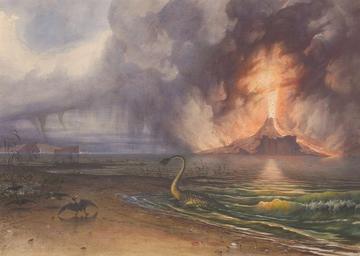
Leander Russ, Vorweltliche Landschaft, 1842
Download the programme here.
Convened by Ernesto Ruiz-Eldredge Molina (Université de Poitiers, Goethe Universität, Frankfurt, Centre Marc Bloch, Berlin) & Isolda Mac Liam (Sussex University & Centre Marc Bloch, Berlin)
The term ‘natural history’ fell into disuse with the emergence of specialised scientific disciplines, such as biology and geology in the late nineteenth century. Notably, however, it was revived in twentieth-century German critical theory, where it served as a central conceptual tool. Thinkers within this tradition employed this concept as a means to overcome the conventional philosophical dichotomy between nature and history, and to explore the complex ways in which they are mutually constituted.
In light of the escalating social and ecological crises of the present, two opposing philosophical trends have emerged: one advocates a return to nature as a foundation for political renewal, while the other places confidence in technological progress as a driver of social transformation.
The classical conceptual opposition between nature and civilisation, or also between nature and history, appears inadequate for examining either theoretical tendency, since both unification and mere juxtaposition fail to explain in their specificity either the natural world or human phenomena. Instead, it can be argued that in this way something of the historical and social is projected onto the natural, and vice versa. The complexities of the intertwining of nature and history thus require a dialectical approach.
The concept of “natural history” (Naturgeschichte), dear to the tradition of critical theory, was forged in an attempt to propose a perspective that is up to this theoretical challenge. Rather than engaging in a debate concerning the dialectical character of nature, or the necessity of a non-human nature for the resurgence of politics, the focus shifted to the objective presence of the natural in society: natural legality, wrote Adorno, “is real as a law of motion for the unconscious society”. In its broadest form, the concept of natural history addresses the reciprocal movement of the naturalisation of conditions that have a historical index, on one side, and the way in which what is natural is constantly reposited, on the other. The Frankfurt School tendency to read this as a dialectic between society and individual, in which social constitution never properly erases the moment of nature even as it shapes it, provides a useful
heuristic for analysing phenomena such as the resurgence of regressive fascist desires, insofar as it permits a cross-reading with the Freudian idea of history as the history of repression and the notion of the “domination of nature”. However, the concept of nature-history remains under-explored when the relation in question is not that of individuals to society but expanded to the scale of world history, which is to say to reflect the role of the world market in connecting diverse economies. To ask a perhaps naive question: if the world market is the core condition of world history, to what would the nature in the natural-history dialectic correspond at this level? To heterochronous modes of life not fully absorbed but reconstituted by the world market? Also, how do these relate to the more psychoanalytical dimension of the natural-history dialectic? And, more generally, is it possible (and necessary) to imagine a configuration of the relation to nature completely freed of its domination? Behind this are various methodological questions, for instance about the way in which the Hegelian conceptual framework that subtends much of the Frankfurt School’s inquiry, such as that of ‘totality’, can be repurposed to explore real global phenomena such as colonialism, hegemonic structures, etc., or whether those concepts are bound to falter when confronted with contemporary problems beyond those of the society and the era in which they were born.
Addressing both scholars and a general audience, the conference aims to reexamine the concept of Naturgeschichte, seeking to elaborate on its continued significance for the present moment, both in its traditional application and broadened framework.
This event is funded with the generous participation of Centre Marc Bloch, Berlin, CHASE (Arts and Humanities Research Council, UK), and Maison Française d’Oxford.